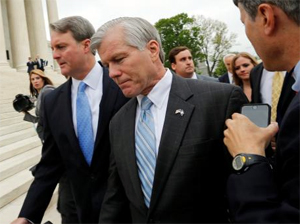
The U.S. Supreme Court on Wednesday appeared poised to throw out the corruption convictions of former Virginia Governor Robert McDonnell, a move federal prosecutors fear could undermine their ability to bring crooked politicians to justice.
During the one-hour argument, several of the eight justices signaled that McDonnell's acceptance of $177,000 in luxury gifts and sweetheart loans from a businessman seeking to promote a dietary supplement did not constitute a criminal act.
They voiced concern that the broad interpretation of U.S. anti-corruption law used by federal prosecutors could criminalize numerous commonplace actions by politicians.
U.S. Justice Department lawyer Michael Dreeben told the justices overturning McDonnell's conviction and giving politicians more leeway to accept gifts in return for certain actions would be a "recipe for corruption."
McDonnell's lawyer Noel Francisco argued the former governor's conduct was no different than what politicians across the United States do on a daily basis when responding to requests from donors and constituents.
McDonnell, 61, is a former Republican Party rising star who served as governor from 2010 to 2014 and once was considered as a possible vice presidential candidate. His wife, Maureen, was convicted in a separate trial.
Prosecutors during his trial described the luxurious lifestyle the McDonnells lived thanks to Virginia businessman Jonnie Williams including vacations, designer clothing and shoes, a $6,500 Rolex watch, $15,000 for their daughter’s wedding, golf outings and more.
Liberal and conservative justices alike raised concerns about the Justice Department's interpretation of U.S. bribery law. Stephen Breyer described as "dangerous" the "enormous power over elected officials" that federal prosecutors would hold if the court endorsed the Justice Department's position.
A ruling is due by the end of June.
A decision in McDonnell's favor could limit the type of cases federal prosecutors could bring against politicians in the future by requiring that any action taken in return for a bribe must be more than, for example, simply arranging a meeting between a benefactor and a government official. The impact of the decision would depend on how far the justices are willing to go in narrowing the scope of the corruption laws.
The justices potentially could overturn the conviction but issue a narrow ruling focusing on the specifics of McDonnell's case, including the judge's instructions to the jury on how to weigh the evidence, rather than finding that the corruption law used in the case was flawed. Even if his conviction is overturned, McDonnell could face a retrial.
Chief Justice John Roberts appeared to favor a broad ruling saying the statutes under which McDonnell was convicted could be unconstitutionally vague because they can cover many different activities. Roberts cited the example of a businessman seeking state tax breaks in return for opening a new plant. Roberts wondered if it would be considered a corrupt act if the state's governor accepted an invitation from the businessman to go on a fishing trip to discuss the proposal.
Breyer and Justice Anthony Kennedy said politicians need guidance so they know what conduct potentially could be prosecuted. If the law is interpreted broadly, "political figures will not know what they are supposed to do and what they are not supposed to do," Breyer said.
CONVICTED ON 11 COUNTS
After a trial that laid bare rifts in his marriage, McDonnell was convicted of 11 corruption counts including conspiracy, bribery and extortion for taking the gifts and loans in exchange for promoting a dietary supplement called Anatabloc made by Williams' company Star Scientific.
Williams wanted McDonnell to press researchers at Virginia state universities to conduct studies that could help win U.S. regulatory approval for Anatabloc.
A judge sentenced McDonnell to two years behind bars, but the Supreme Court last year said he would not have to report to prison while appeals were ongoing.
McDonnell's wife was found guilty of nine criminal counts and received a one-year sentence. She remains out of prison while pursuing her own separate appeal.
Sonia Sotomayor, one of the only justices to indicate support for the prosecution, suggested it was reasonable to infer that McDonnell's intent was to help Williams when he accepted money and gifts.
Some justices appeared troubled by the signal a ruling in his favor would send. Ruth Bader Ginsburg appeared alarmed by the idea of officials being able to accept payments to arrange meetings without facing potential prosecution. Officials could simply say "I'll do it for you if you pay me a thousand dollars," she said.
McDonnell, one of few high-level politicians to have his appeal of a criminal conviction heard by the Supreme Court, sat with his wife in the courtroom for the last oral arguments of the justices' current term.
McDonnell's lawyers contend the former governor's conduct did not constitute "official action" in exchange for a thing of value, as required for conviction under federal bribery law.
(Published by Reuters – April 27, 2016)